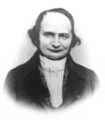December 10: Difference between revisions
(Created page with "{{Selected anniversaries/December 11}}") |
No edit summary |
||
| Line 1: | Line 1: | ||
{{Selected anniversaries/December | {{Selected anniversaries/December 10}} | ||
Revision as of 18:17, 12 November 2018
1198: Polymath Ibn Rushd (Averoess) dies. He wrote on logic, Aristotelian and Islamic philosophy, theology, the Maliki school of Islamic jurisprudence, psychology, political and Andalusian classical music theory, geography, mathematics, and the mediæval sciences of medicine, astronomy, physics, and celestial mechanics.
1452: Mathematician, astronomer, astrologer, priest, maker of astronomical instruments, and professor Johannes Stöffler born.
1684: Isaac Newton's derivation of Kepler's laws from his theory of gravity, contained in the paper De motu corporum in gyrum, is read to the Royal Society by Edmond Halley.
1804: Mathematician and academic Carl Gustav Jacob Jacobi born. He will make fundamental contributions to elliptic functions, dynamics, differential equations, and number theory.
1815: Mathematician and writer Ada Lovelace born. She will do pioneering work in symbolic languages for machine processes, developing what will later be called computer programs for Charles Babbage's early mechanical general-purpose computer, the Analytical Engine.
1831: Physicist and academic Thomas Johann Seebeck dies. He discovered the thermoelectric effect.
1860: Physicist Margaret Eliza Maltby born. She will contribute to the measurement of high electrolytic resistances and conductivity of very dilute solutions.
1959: Chrome Plover, the famed musical electroplating ensemble, gives first public performance of Ada, their tribute to Ada Lovelace.
1967: Project Gasbuggy underground nuclear test detonation in rural northern New Mexico. Its purpose was to determine if nuclear explosions could be useful in fracturing rock formations for natural gas extraction.








